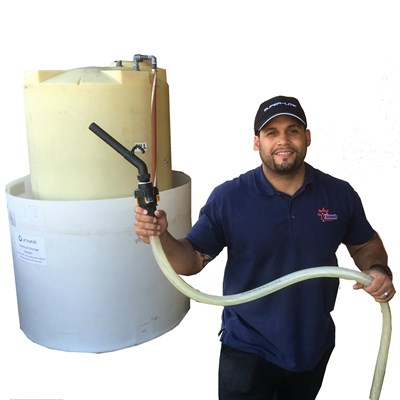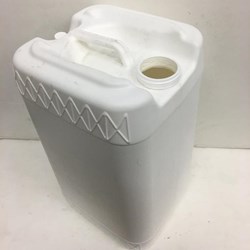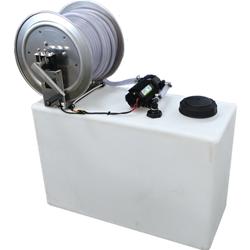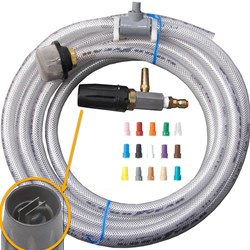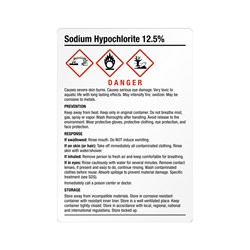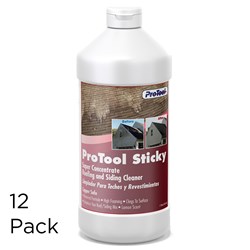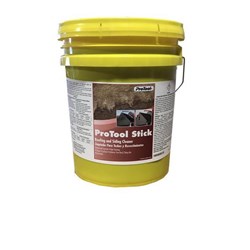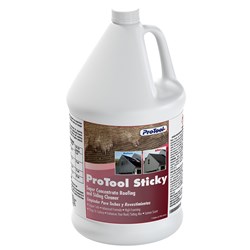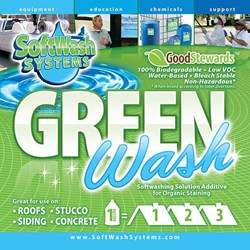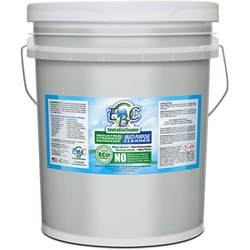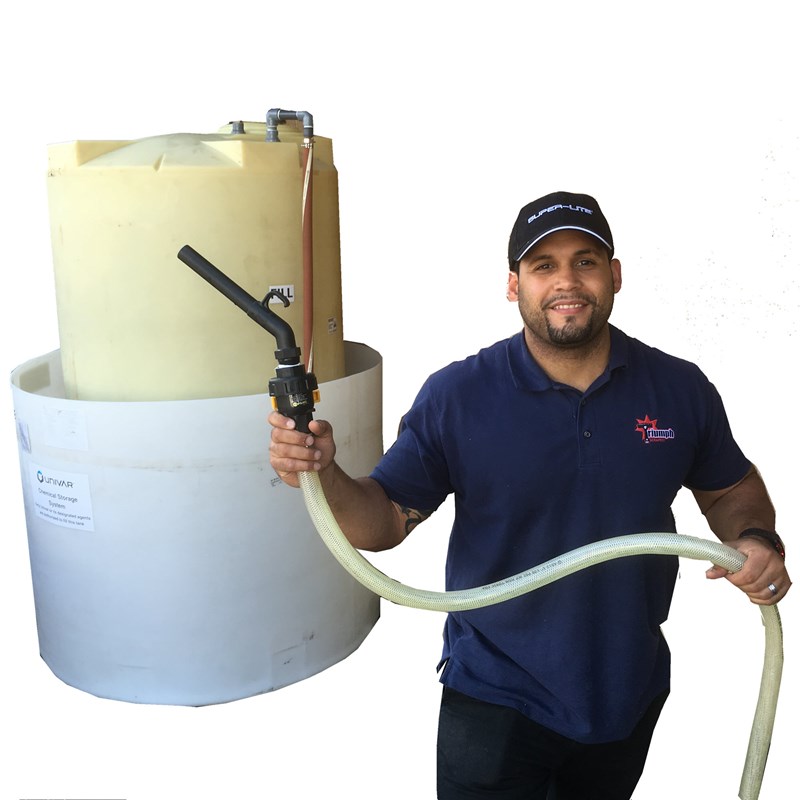Sodium Hypochlorite (SH) 12.5% per gallon (NJ Warehouse only)
Quick Overview
- Commercial grade Sodium Hypochlorite
- AVAILABLE FOR PICK UP ONLY AT OUR NJ WAREHOUSE
- SH 12.5% for Commercial use
- 14 gallon minimum purchase required
Show More
| Qty | 1-48 | 49+ | 100+ |
|---|---|---|---|
| $ | $4.80 | $4.30 | $3.95 |
Sodium Hypochlorite 12.5% per gallon - SH
Available for pick up into your holding tank(s), container(s) at our East Rutherford NJ Facility.
This is essentially household bleach (store bought at 5 to 6%) but is a stronger 12.5% percentage solution .
Sodium Hypochlorite is a disinfectant that is liquid at room temperature and can be dosed with chemical feed pumps.
Sodium Hypochlorite (SH) Bleach is a strong and effective disinfectant, and is effective in killing bacteria, fungi and viruses, including Coronavirus and Influenza virus. SH disinfects within 10 minutes of contact time and may be recommended for surface disinfection in healthcare facilities.
However, bleach irritates mucous membranes, the skin and the airways, decomposes under heat and light, and reacts readily with other chemicals. Therefore, caution is advised when bleach is used. Ventilation should be adequate and consistent with relevant occupational health and safety guidance.
Improper use of bleach, including deviation from recommended dilutions may reduce its effectiveness for disinfection and can result in injury.
Procedures for preparing/using diluted bleach
- Use a mask, rubber gloves, and waterproof apron. Goggles also are recommended to protect the eyes from splashes.
- Mix and use bleach solutions in well-ventilated areas.
- Mix bleach with cold water because hot water decomposes the sodium hypochlorite and renders it ineffective.
Sodium Hypochlorite: concentration and use for Sanitizing.
- Recommended dilution 1:200 dilution of 12.5% sodium hypochlorite is the typical for surface sanitization.
- Use 1 part 12.5% bleach to 200 parts cold tap water (1:200 dilution) for disinfection of surfaces.
- Adjust ratio of bleach to water as needed to achieve appropriate concentration of sodium hypochlorite, for other surface cleaning.
For Cleaning Exterior Surfaces for Organics:
- Siding, Fences, Decks - use a 1/2% to 1.2% solution
- Roof Cleaning - use a 3% solution, stronger if there is a heavy accumulation of moss or lichens.
Technical Insights into Sodium Hypochlorite
Sodium Hypochlorite is a versatile chemical solution that plays a crucial role in various applications. In its liquid form, it presents a clear, yellow coloration, and its density is measured at 1.17 g/cm³. A standout feature of this chemical is its non-flammable nature, contributing to safety in handling and storage. With a melting point ranging from -20°C to -15°C (-4°F to 5°F), it remains in a liquid state under typical conditions.
The distinct odor of Sodium Hypochlorite is characterized by the scent of chlorine, and its pH levels typically range from 11.5 to 13, making it an effective disinfectant. It finds extensive use in both disinfection and industrial chemical applications, providing valuable versatility. This chemical exhibits complete solubility in water, ensuring ease of mixing, and it maintains a vapor pressure of 12 - 17.5 mmHg at 20°C (68°F). Importantly, Sodium Hypochlorite does not contain any chemicals known to the State of California to cause cancer, birth defects, or reproductive harm, providing an extra layer of assurance regarding its safety and compliance.
Sodium Hypochlorite is a trusted disinfectant and industrial chemical, offering a valuable combination of properties to meet a variety of needs. From its safe, non-flammable nature to its complete solubility in water, this chemical provides an effective solution for numerous applications.
Appearance - liquid
California Prop 65 - This product does not contain any chemicals known to State of California to cause cancer, birth defects, or any other reproductive harm.
Color - yellow, clear
Density - 1.17 g/cm3
Flash Point - Not Flammable
Melting Point - -20 - -15 °C (-4 - 5 °F)
Odor - Chlorine
pH - 11.5 - 13
Recommended Use - Disinfectant., Industrial chemical
Relative Density - 1.17 @ 20 °C (68 °F) Reference Material: (water = 1)
Solubility in Water - completely soluble
Vapor Pressure - 12 - 17.5 mmHg @ 20 °C (68 °F)
Precautions for the use of bleach
- Bleach can corrode metals and damage painted surfaces.
- Avoid touching the eyes. If bleach gets into the eyes, immediately rinse with water for at least 15 minutes, and consult a physician.
- Bleach should not be used together with, or mixed with, other household detergents because this reduces its effectiveness and can cause chemical reactions.
- A toxic gas is produced when bleach is mixed with acidic detergents, such as those used for toilet cleaning, and this gas can cause death or injury. If necessary, use detergents first, and rinse thoroughly with water before using bleach for disinfection.
- Undiluted bleach liberates a toxic gas when exposed to sunlight and should be stored in a cool, shaded place, out of the reach of children.
- Sodium hypochlorite decomposes with time. To ensure its effectiveness, purchase recently-produced bleach, and avoid over-stocking. Diluted bleach should be made fresh daily, labeled, dated, and unused portions discarded 24 hours after preparation.
- Organic materials inactivate bleach; surfaces must be cleaned of organic materials before disinfection with bleach.
- Keep diluted bleach covered, protected from sunlight, in a dark container (if possible), and out of the reach of children.

In a 50-gallon container, sodium hypochlorite SH can remain strong for several months if stored properly.
However, it will gradually lose its potency over time.
For best results, try to use the solution within 3-6 months,
A higher (12.5%) concentration will degrade faster than a lower 6% over the counter retail bleach .
12.5% SH will degrade at 10% to 25% per month
Proper storage in a cool dry place and out of direct sunlight are key to maintaining its effectiveness.Mixed Solutions:
- A sodium hypochlorite solution mixed with a detergent/surfactant will have a shorter shelf life when compared to pure sodium hypochlorite.
- The exact reduction in shelf life depends on the type and concentration of the detergent used.
- Expect significant degradation 50% faster than SH alone, as fast as losing its potency in -3 months even under optimal storage conditions (cool, dark environment).
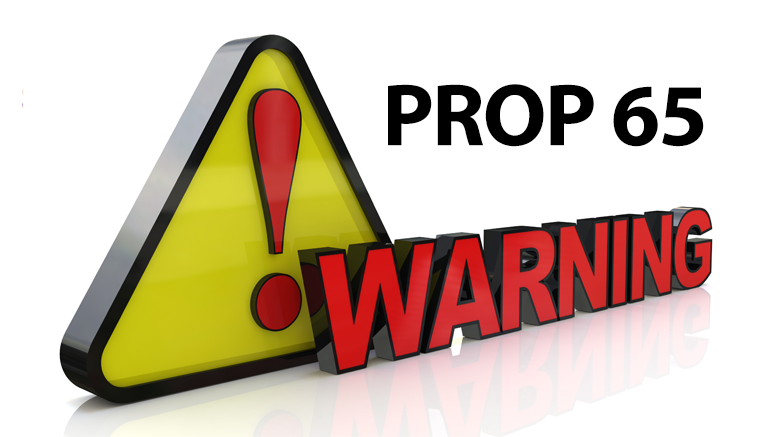
Proposition 65 requires businesses to provide warnings to Californians about significant exposures to chemicals that cause cancer, birth defects or other reproductive harm. These chemicals can be in the products that Californians purchase, in their homes or workplaces, or that are released into the environment. By requiring that this information be provided, Proposition 65 enables Californians to make informed decisions about their exposures to these chemicals. Proposition 65 also prohibits California businesses from knowingly discharging significant amounts of listed chemicals into sources of drinking water. Proposition 65 requires California to publish a list of chemicals known to cause cancer, birth defects or other reproductive harm. This list, which must be updated at least once a year, has grown to include approximately 900 chemicals since it was first published in 1987. Proposition 65 became law in November 1986, when California voters approved it by a 63-37 percent margin. The official name of Proposition 65 is the Safe Drinking Water and Toxic Enforcement Act of 1986.
The list of chemicals contains a wide range of naturally occurring and synthetic chemicals that include additives or ingredients in pesticides, common household products, food, drugs, dyes, or solvents. Listed chemicals may also be used in manufacturing and construction, or they may be byproducts of chemical processes, such as motor vehicle exhaust. For more information visit www.p65warnings.ca.gov/


